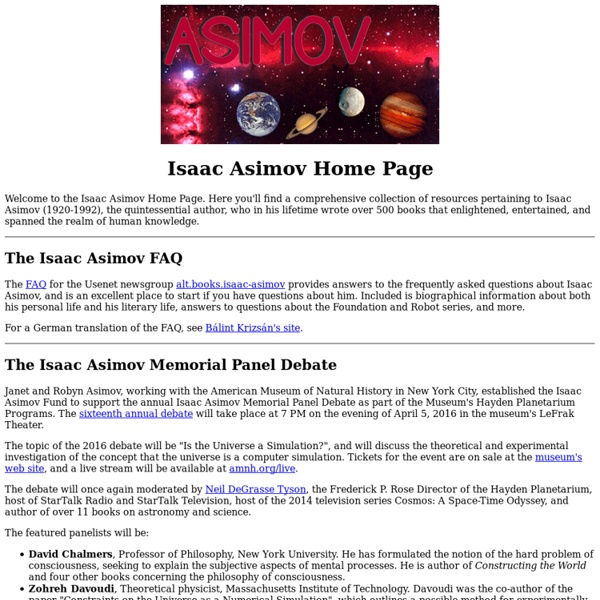Dan Simmons - Author's Official Web Site
nauka, racjonalizm, wiara, felietony, forum, PSR
Camille Paglia
American feminist academic and critic Personal life[edit] Paglia was born in Endicott, New York, the eldest child[4] of Pasquale and Lydia Anne (née Colapietro) Paglia. All four of her grandparents were born in Italy. Her mother emigrated to the United States at five years old from Ceccano, in the province of Frosinone, Lazio, Italy.[2][5] Paglia has stated that her father's side of the family was from the Campanian towns of Avellino, Benevento, and Caserta. For more than a decade, Paglia was the partner of artist Alison Maddex.[17][18] Paglia legally adopted Maddex's son (who was born in 2002).[19] In 2007, the couple separated[20] but remained "harmonious co-parents," in the words of Paglia, who lived two miles (three kilometers) apart.[4] Paglia considers herself transgender, and says that "never once in my life have I felt female".[21] Paglia is an atheist, but has stated she has "a very spiritual mystic view of the universe".[22] Education[edit] Career[edit] Views[edit] Feminism[edit]
William Gibson - Official Website
H. G. Wells
Herbert George "H. G." Wells (21 September 1866 – 13 August 1946)[3] was an English writer, now best known for his work in the science fiction genre. He was also a prolific writer in many other genres, including contemporary novels, history, politics and social commentary, even writing textbooks and rules for war games. Wells is sometimes called "The Father of Science Fiction", as are Jules Verne and Hugo Gernsback.[4][a] His most notable science fiction works include The War of the Worlds, The Time Machine, The Invisible Man and The Island of Doctor Moreau. Wells's earliest specialised training was in biology, and his thinking on ethical matters took place in a specifically and fundamentally Darwinian context.[5] He was also from an early date an outspoken socialist, often (but not always, as at the beginning of the First World War) sympathising with pacifist views. Early life[edit] Teacher[edit] H. H. He soon entered the Debating Society of the school. During 1888 H. Personal life[edit]
The Bujold Nexus - The Lois McMaster Bujold Homepage
George Orwell
English author and journalist (1903–1950) Eric Arthur Blair (25 June 1903 – 21 January 1950), better known by his pen name George Orwell, was an English novelist, essayist, journalist, and critic.[1] His work is characterised by lucid prose, social criticism, opposition to totalitarianism, and support of democratic socialism.[2] Blair was born in India, and raised and educated in England. After school he became an Imperial policeman in Burma, before returning to Suffolk, England, where he began his writing career as George Orwell—a name inspired by a favourite location, the River Orwell. He lived from occasional pieces of journalism, and also worked as a teacher or bookseller whilst living in London. From the late 1920s to the early 1930s, his success as a writer grew and his first books were published. Life[edit] Early years[edit] Blair family home at Shiplake, Oxfordshire In January, Blair took up the place at Wellington, where he spent the Spring term. Policing in Burma[edit] Andrew N.
Stanislaw Lem



